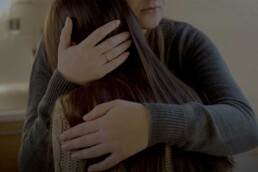What is Clare's Law
The Domestic Violence Disclosure Scheme (DVDS) also known as Clare’s Law, allows any member of the public to ask the police if their partner or former partner may pose a risk to them. Once an application is made, police and partner agencies will carry out a range of checks. They will consider disclosing this information if the checks reveal a record of abusive offences or suggest a risk of violence or abuse.
The process is named after Clare Wood, who was murdered by her ex-boyfriend George Appleton in 2009. Clare had met Appleton on Facebook and was not aware of his horrific history of violence against women, including repeated harassment, threats and the kidnapping at knifepoint of one of his ex-partners. Appleton strangled Clare and set her on fire before taking his own life in Salford, Greater Manchester.
This scheme enables the police to release information about any previous history of violence or abuse a person might have.
Under Clare's Law you can:
- apply for information about your current or ex-partner because you're worried they may have a history of abuse and are a risk to you
- request information about the current or ex-partner of a friend or relative because you're worried they might be at risk
The Silent Victims: How Does Domestic Abuse Impact Children?
Domestic violence casts a long and dark shadow not only over its immediate victims but also over the most vulnerable members of our society – children. Being in the same room or house where domestic violence is taking place, and consequently being able to see or hear it happening, can affect a child just as severely as if they themselves were being physically hurt or abused.
Domestic abuse can impact children to such an extent, that the Domestic Abuse Act 2021 recognises that any child witnessing domestic abuse, is also a victim.
Children who witness domestic violence face a multitude of challenges that can significantly impact their emotional, social, and psychological development. In this blog, we will be outlining the devastating effects that domestic violence can have on children, and highlighting the importance of understanding and addressing these issues to break the cycle of violence.

Short Term
Emotional Impact
Witnessing domestic violence can have profound and immediate emotional consequences on children. In the short term, they may experience a range of intense emotions such as fear, anxiety, a diminished sense of self-worth, and confusion as a result of their traumatic experiences. Witnessing violence within their home, a place of supposed safety, can significantly disrupt their sense of security and stability, leaving them incredibly distressed. Children may also grapple with feelings of helplessness and guilt, often blaming themselves for the aggression that they are witnessing. This emotional toll can manifest itself in disrupted sleep patterns, nightmares, and heightened stress levels, severely affecting their overall well-being. Constant exposure to such traumatic behaviour can also alter a child’s perception and understanding of relationships, trust, and safety, potentially putting them at risk of developing serious long-term mental health issues, such as depression and PTSD.
The emotional repercussions of witnessing domestic violence can be devastating, highlighting the importance of seeking the right interventions and support to mitigate the lasting effects of domestic abuse on a child’s emotional wellbeing and development.
Behavioural Changes
The behavioural impact of witnessing domestic violence can be equally profound for children. Often, when exposed to this trauma children may exhibit immediate changes in their behaviour as a coping mechanism. They may become withdrawn, displaying signs of social isolation and shyness, or conversely, act out in anger and defiance, mirroring the violent behaviours they have witnessed to incorporate aggression into their own interactions. In pre-school aged children, the stress and anxiety induced by a volatile environment in the home can lead to a regression in developmental milestones, meaning they may begin to exhibit the behaviours of a much younger child, such as bed-wetting, thumb-sucking and frequent crying or whining. Children may also begin to struggle with heightened separation anxiety, and show signs of extreme fear through behaviours like stuttering and hiding.
This broad spectrum of possible behavioural changes aren’t just a disruption to a child’s daily life, but they can also seriously hinder academic performance and social relationships.
Educational Challenges
The turmoil experienced at home as a result of domestic abuse can also follow a child to school, presenting further challenges throughout their education. The above emotional and behavioural issues often impede a child’s ability to focus, concentrate, retain information, and participate in classroom activities. These factors can make it incredibly difficult for a child to progress through school as normal, and they may experience serious academic setbacks as a result. In addition to potential issues in the classroom, children may also struggle socially at school. The behavioural problems that can arise from witnessing domestic abuse in the home may lead to disciplinary problems in academic settings, as well as potential social isolation, as a child struggles to form healthy relationships with peers.
Early recognition and appropriate interventions are crucial in mitigating these educational obstacles for a child and fostering a path towards academic success and emotional well-being.
Long Term
Mental Health
The long-term ramifications of witnessing domestic violence early in life often manifest in persistent emotional and psychological difficulties that can continue into adulthood. Individuals who witness domestic abuse when they are growing up are at an increased risk of developing serious mental health conditions such as complex post-traumatic stress disorder, anxiety, depression and emotionally unstable personality disorder. The impact of living with this type of trauma, and any subsequent mental health issues, can disrupt many aspects of an adult’s life, presenting challenges with financial stability, relationships and work.
Relationships
The long-term effects of witnessing abuse during childhood can significantly impact a person’s ability to form and maintain healthy relationships later in life. Exposure to domestic violence can shape a child’s understanding of interpersonal dynamics, trust, and emotional intimacy. Individuals who have witnessed abuse may struggle with establishing secure attachments, often experiencing difficulties in trusting others or forming deep connections. The fear, anxiety, and unpredictability associated with domestic violence can contribute to challenges in communication, conflict resolution, and emotional vulnerability. These individuals may grapple with insecurities, fear of abandonment, or a heightened sensitivity to perceived threats within their relationships.
Children will learn from the behaviour of the adults around them, meaning the patterns of unhealthy and abusive behaviour that they’ve witnessed growing up can become an internalised blueprint for their own relationships in adulthood. This means that aggression cam be unintentionally replicated and they may go on to become an abuser themselves, perpetuating a cycle of dysfunction.
Breaking free from the long-term impacts of witnessing abuse often requires therapeutic intervention and support to help individuals build a foundation for healthy, positive relationships in adulthood.
Risky Behaviours
The trauma of witnessing domestic violence can increase the likelihood of an individual engaging in risky behaviours later in life, such as substance abuse. People who have experienced the stress and emotional turmoil of an abusive environment may turn to substances such as drugs or alcohol as a way to numb painful memories and escape overwhelming emotions. The lack of healthy coping mechanisms learned during formative years, coupled with the desire to dull emotional pain, can lead to a higher risk of substance abuse in adulthood. Additionally, as we know that those who witness abuse are at an increased risk of developing mental health issues, this further heightens the likelihood that they may engage in risky behaviours.
Tackling substance abuse often requires comprehensive specialist support that addresses both the emotional scars from witnessing abuse and provides healthier coping mechanisms for navigating life’s challenges.
Conclusion
Each child responds differently to their experiences of abuse and trauma. The sooner they are able to receive the help and support they need, the easier it will be for them to heal. A specialist worker will be able to help them begin to process their memories, learn how to form healthy relationships and coping mechanisms, and ultimately facilitate their growth into a strong, well-rounded adult.
If you are concerned that your child may be suffering because they have witnessed domestic abuse, contact us today and we can help you to choose the right path for your child.
1 in 3 children who witness domestic abuse, go on to become a victim. Talk to us. Change starts with a conversation.
Living in a Pandemic
Living in a Pandemic
Our first instincts as humans when faced with crisis or threat is to turn to other humans, to seek solace, to seek connection, to try to stay safe and to try to make sense of what is happening. However, in this Pandemic we are being told: To stay away! That crowds are dangerous! Even people are dangerous! Do not go see your elderly mum or grandma, as we could dangerous!Read more
Ten Signs of Domestic Abuse
Advice
When people hear the words “domestic violence,” they almost instantly think of a person, most likely a man, physically abusing his partner. And, they wouldn’t necessarily be wrong. This type of dreaded behaviour accounts for a decent percentage of abuse within a relationship.
However, contrary to the general misconception, domestic violence engulfs a wide range of abusive behaviours, most of which do not even include physical contact. Experts estimate that in the UK, domestic abuse will affect 1 in 4 women and 1 in 6 men in their lifetime.
We rounded up the 10 most common signs of domestic violence that allude to a potentially abusive partner. You should look out for these symptoms of domestic abuse in a person before engaging in a serious relationship with them!
-
Physical abuse
One of the most common forms of domestic violence occurs when one partner uses physical force to abuse the other half of the couple. If the maltreatment continues, the abuser feels more confident in using disproportionate force and/or objects or weapons to hurt the other person.
-
Mental or emotional abuse
In this case, the abuser substitutes physical hits for a verbal offense. More than often, he or she will threaten and bully the other person into submission.
Some emotional abusers are very well aware of the mental power that they hold over their partners. They use subtle tactics and psychological games to intimidate and manipulate their partners into doing their bid.
-
Controlling money
The financial situation of a couple needs to be in balance to ensure a carefree, long-lasting relationship.
Unfortunately, some partners prefer to keep financial secrets from their loved ones. Others aim to gain control over how their partners spend their money.
Both of these toxic behaviours are signs of domestic violence and potential abuse in the future.
-
Invading private communication channels
Despite being in a perfectly honest relationship, partners should be free to maintain their privacy when it comes to phone contacts, email conversations, and social media activity.
This kind of freedom is unthinkable for overly controlling individuals. They demand their partners to share every aspect of their private lives. Sometimes, they go as far as to check their phone or their messages without their partners’ knowledge or consent.
-
Forced Isolation
A healthy relationship grows steadily when the couple spends a great deal of time together. However, the bond grows even stronger when the two get to spend time alone from each other, seeing friends and family.
If your new partner is keeping you from meeting friends or loved ones, you might be dealing with a potentially dangerous abuser.

-
Cruelty towards animals and/or children
Some abusers may act lovingly towards their partners, but they show their true faces when they mistreat children or animals.
-
Threats or intimidation
A clear sign that someone may be domestically violent is seeing them damage things on purpose. These types of abusers are ill-equipped to use physical dominance or verbal manipulation, so they choose to hurt their partners by destroying something valuable to them.
-
Threats of suicide
The fear of their partners ending a relationship may lead some abusers to use false threats of suicide.
-
Drug or alcohol abuse
Addiction to drugs or alcohol may transform regular individuals into abusers that use physical force and emotional intimidation to control their partners.
-
Extreme jealousy or possessiveness
This kind of domestic violence occurs when one of the partners demands to know where their significant other is at every moment. The abuse takes many forms, such as calling or visiting to check where their partners are, what are they doing, and with whom, even going as far as dictating what to wear and what to say.
No matter how strong your feelings are for a person, you should know that these types of behaviour are completely unacceptable and intolerable in a relationship. If you are the victim of such actions from your partner, you should seek professional guidance from a health professional.
CALL OUR HELPLINE FOR SUPPORT:
0808 802 0028
The Helpline is open Monday to Saturday 8am to 8pm and is free from all mobiles, landlines and payphones. It is also hidden on the telephone bill.
MORE FROM OUR SUPPORT BLOG
Ten Signs of Domestic Abuse
When people hear the words…
Ten Signs of Emotional Abuse
Out of all the forms of…
Domestic Abuse – Leicester Charity
Domestic abuse is a pattern…
Ten Signs of Emotional Abuse
Advice
Out of all the forms of domestic violence, emotional abuse is the most difficult one to spot. The victims usually trade their comfort and emotional stability for their abusing partners’ love. On the other hand, abusers develop an addiction to the sick pleasure that they get from tormenting their loving partners.
Some people live their entire lives without realising that they have been the victims of severe emotional abuse. Here are 10 signs of how mental and emotional mistreatment look like in a relationship, and which you should keep an eye for in your current or next liaison!
-
Your partner isolates you from your loved ones
Abusive partners demand that you spend all of your time with them. They ask for 100% of your attention, and they get angry when you don’t comply. In their bid to control you and your time, they will create barriers between you and your friends or your family. Spending time alone or apart is unthinkable for them.
-
Your partner verbally abuses you
Some abusers use verbal communication as an offensive weapon in a relationship that they otherwise consider to be a loving one.
Such an abusive partner will insult you with derogatory names, disturbing jokes, and even blatant curse words. Whether you respond back or not, they will continue to harass you verbally into submission.
-
Your partner uses emotional manipulation
After verbally mistreating you, abusers may try to manipulate your feelings leading you to feel guilty for their outbursts.
This kind of abusive partner will seek breaches in your emotional armour, and use them to get inside your mind and toy with your feelings. In some cases, they will even threaten you with leaving if you don’t change your behaviour that led to their tantrum.
-
Your partner has an infinite resource of scapegoats
If your new partner always finds someone to blame for their failures or their defects, you might be dating a potentially abusive person.
Someone who cannot take responsibility for their mistakes is not ready for a mature relationship. Moving ahead with an emotionally abusive partner can lead to severe trauma in the future. The kind of person that always finds scapegoats will eventually blame you for their underachievement.
-
Your partner uses addiction to escape emotional responsibility
Some people resort to alcohol or drugs when they cannot admit failure, mistakes, or inappropriate behaviour. An adult that does not resolve past trauma can turn into an abusive partner that uses their addiction to escape emotional responsibility.

- Your partner uses fear to control you
Some abusers extend control over their partners with the threat of violence. Even if they never physically hurt their lovers, they act as if they are always on the brink of doing it.
This type of reprehensible behaviour instils fear and forces you to live in constant anxiety. Your actions and your entire lifestyle may change to avoid potential retribution.
-
Your partner uses physically constraint
Even if your partner does not hit you, he or she can still use physical force to abuse you. Some evident signs of it include grabbing your wrists tightly, holding an arm over your neck or head in a dominant manner, or cornering you in the room and using their body to block your way out.
These signs of physical constraint point to abusive behaviour that may lead to domestic violence and tragic consequences in the future.
-
Your partner deprives you of affection
Another sign of emotional abuse is when your partner chooses to punish you for spending time away or for not giving them the attention that they demand. In this case, they intentionally deprive you of affection and act upset until you beg for their pardon.
-
Your partner treats you like a servant
This kind of emotional abuse is difficult to acknowledge even by the victims. Abusers develop a sense of entitlement that they use to treat their partners as servants. As a result, they demand constant care, attention, help, and supervision as if they were royalty.
-
Your partner is extremely jealous and possessive
A possessive partner has no consideration for your individuality. Such an abuser will try to gain full control over your life including your dreams, goals, and personal tastes. Their jealousy is limitless, and they will act on it to prevent you from spending time with other people than those of their choosing.
All of these signs of emotional abuse point to an immature individual who is not ready to commit to a serious, long-lasting, and happy relationship. If you encounter them in your partner, you should immediately have a calm and constructive conversation about the risks that they hold for your relationship.
Remember that emotional abuse is never a convenient price to pay for being in a relationship with someone. Seek external support to try to repair or end this kind of relationship with your partner. Professional counsel should help you overcome the trauma that results from being emotionally abused in a toxic relationship!
If you feel like you are experiencing any of these and you are located in the Leicester, Leicestershire or Rutland area please call our helpline today on 0808 802 0028. The helpline is open Monday to Saturday 8am to 8pm and is free from all mobiles, landlines and payphones. It is also hidden on the telephone bill.
CALL OUR HELPLINE FOR SUPPORT:
0808 802 0028
The Helpline is open Monday to Saturday 8am to 8pm and is free from all mobiles, landlines and payphones. It is also hidden on the telephone bill.
MORE FROM OUR SUPPORT BLOG
Ten Signs of Domestic Abuse
When people hear the words…
Ten Signs of Emotional Abuse
Out of all the forms of…
Domestic Abuse – Leicester Charity
Domestic abuse is a pattern…
Domestic Abuse - Leicester Charity
Advice
Domestic abuse is a pattern of behaviour on the part of an abuser designed to control their partner. It can happen at any point in a relationship, including after you have split up. Anyone forced to change their behaviour because they are frightened of their partner or ex-partner’s reaction is experiencing abuse.
Domestic abuse can happen to anyone, regardless of age, background, gender, religion, sexuality, HIV status, class, location or ethnicity. However, statistics sadly show most domestic abuse is carried out by men and experienced by women. Domestic abuse can also include forced marriage and so-called ‘honour crimes’.
Domestic abuse is an incident or pattern of incidents involving controlling, coercive, threatening, degrading and violent behaviour, including sexual violence. If you want to know about other services that we offer, please read our website. If you are in immediate danger, please call 999 today.

You might think that it would be quite easy to spot if a person is the victim of domestic abuse but, in reality, this can be quite difficult to do. Studies have shown that controlling and abusive partners can be skilled and making sure the signs of the harm that they cause are secret and hidden. Still this does not mean that the signs are invisible.
All relationships are unique, and it is difficult, if not impossible, to say what is a normal relationship. However, there are healthy relationships and unhealthy relationships. It helps to be able to recognise the negative signs in both your own relationships and those near to you who may be experiencing issues. Remember, if you ever feel unsafe or you are concerned about somebody else’s safety then take action today.
Remember, domestic abuse is never the fault of the person who is experiencing it. “Domestic abuse is a crime”. Spotting the signs is critically important. If you feel you are seeing the signs, then reach out to us for support today.
• Do they control your money?
• Is your partner jealous and possessive?
• Are they charming one minute and abusive the next?
• Do they tell you what to wear, where to go, who to see?
• Do they pressure you to have sex when you don’t want to?
• Are you starting to walk on eggshells to avoid making them angry?
• Do they monitor or track your movements or messages?
• Do they use anger and intimidation to frighten and control you?
• Do they constantly put you down?
• Do they play mind games and make you doubt your judgement?
How we can support you
If you need support you can call our helpline today 0808 802 0028. The helpline is open Monday to Saturday 8am to 8pm and is free from all mobiles, landlines and payphones. It is also hidden on the telephone bill so if you are in the Leicester, Leicestershire or Rutland area please contact us today so we can help you today.
Here at Freeva we work closely with other agencies to ensure the right support is in place for you. Freeva are part of the United Against Violence & Abuse (UAVA) consortium – www.uava.org.uk and some of our services are jointly delivered with Living without Abuse (LWA) and Women’s Aid Leicestershire Limited (WALL).
There are a lot of myths and false information around domestic abuse and its causes. Victim-blaming is common, and women are unfortunately being frequently deterred from coming forward for fear of being blamed for the abuse. We work with a range of programs to help you get the support you need today.
Find out how to get help if you or someone you know is a victim of domestic abuse in the Leicester, Leicestershire and Rutland area today.
CALL OUR HELPLINE FOR SUPPORT:
0808 802 0028
The Helpline is open Monday to Saturday 8am to 8pm and is free from all mobiles, landlines and payphones. It is also hidden on the telephone bill.
MORE FROM OUR SUPPORT BLOG
Ten Signs of Domestic Abuse
When people hear the words…
Ten Signs of Emotional Abuse
Out of all the forms of…
Domestic Abuse – Leicester Charity
Domestic abuse is a pattern…












